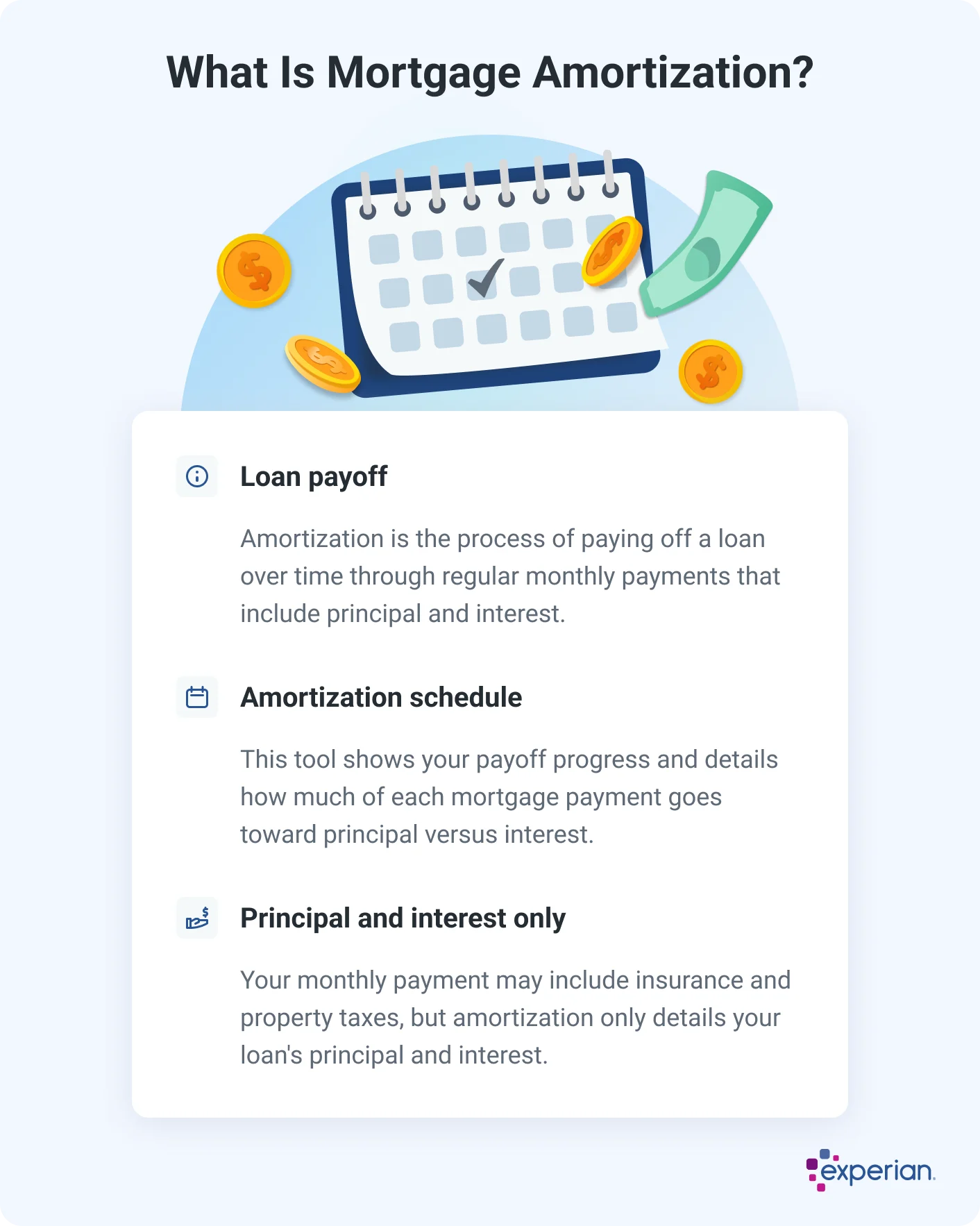What Is Mortgage Amortization?
Quick Answer
Mortgage amortization is the process of making regular, fixed mortgage payments. The payments you make are applied to both the principal and interest until the loan is paid in full.

Mortgage amortization is the process of paying down a home loan over a fixed repayment term, with monthly payments going toward the principal balance and accrued interest.
If you have a mortgage loan or you're considering applying for one, understanding amortization can give you a better idea of what to expect with your payments. Here's what you need to know.
What Is Mortgage Amortization?
An amortized mortgage loan has periodic payments that are applied to both the principal and interest until the loan is paid in full, usually at the end of your repayment term.
The interest portion of your monthly payment is calculated based on your loan's principal balance and interest rate. As a result, you can expect more—if not most—of your payments at the beginning of your repayment term to cover the cost of interest.
As the principal balance goes down, the interest portion of your payment will follow suit. Near the end of your loan, your payment will mostly go toward paying off the remaining principal balance.

Fixed-Rate vs. Adjustable-Rate Amortization
With a fixed-rate mortgage loan, the debt is amortized once at the beginning of the loan's repayment term. Your monthly principal and interest payments remain the same for the life of the loan.
With an adjustable-rate mortgage, however, monthly payments are only fixed for a set period, typically ranging from three to 10 years. After that, the interest rate becomes variable, which means that your monthly payment can be adjusted every six or 12 months.
Each time the interest rate changes, the lender recalculates the amortization schedule to give you a new payment based on the rate, remaining term and loan balance.
Learn more: What Type of Mortgage Loan Is Best?
Compare mortgage rates
Check today’s rates to find the best loan offers. Staying updated on current rates helps you secure a competitive mortgage and save more over time.
What Is a Mortgage Amortization Schedule?
A mortgage loan's amortization schedule shows how much of every monthly loan payment you make goes toward principal and interest until the loan is paid in full.
You should receive an amortization schedule at your closing meeting. A typical amortization schedule includes:
- Loan details: The original loan amount, amortization period and interest rate.
- Payments: The amount of your payment and how often you'll make payments.
- Loan principal payment: The portion of your monthly payment that goes to paying off the loan principal. This number will increase as you pay off your loan.
- Interest: The portion of each monthly payment that goes to paying off the interest portion of your loan. This number will decrease over the life of the loan.
- Outstanding balance: Your outstanding loan balance after each scheduled payment.
How Does Making Extra Payments Affect Amortization?
If you want to pay down your home loan more quickly, one way is to make extra payments toward the principal balance.
When you do this, it reduces how much interest accrues on the loan and also shaves time off your loan's repayment term. Your lender won't recalculate your amortization schedule for you, so your monthly payment won't change.
However, you can use an amortization calculator to better understand how your extra payments impact you.
Learn more: How to Pay Off Your Mortgage Early
Extra payments mortgage calculator
How Mortgage Amortization Calculators Work
A mortgage amortization calculator can help you break down your loan payments and provide you with an amortization schedule. They can also show you the total cost of your monthly payments, as well as interest charges, over the life of the loan.
To use one, simply provide the following details:
- Current principal balance
- Remaining loan term
- Interest rate
You may also have the option to include other housing costs, such as taxes, insurance and homeowners association (HOA) fees. In some cases, you may also be able to include extra monthly payments to see how they can influence your interest charges and repayment term.
Improve Your Credit to Minimize Your Mortgage Interest Costs
With long repayment terms and significant balances, mortgage loans often charge tens or even hundreds of thousands of dollars in interest. So, even a small reduction in the interest rate can result in significant savings.
As you prepare to apply for a mortgage loan—or consider refinancing an existing mortgage—it's important to improve your credit and give yourself a better chance of securing a low interest rate.
To get started, register with Experian to get free access to your Experian credit report and FICO® ScoreΘ. These resources can give you insights into your credit health, as well as the steps you can take to bolster your score.
Curious about your mortgage options?
Explore personalized solutions from multiple lenders and make informed decisions about your home financing. Leverage expert advice to see if you can save thousands of dollars.
Learn moreAbout the author
Ben Luthi has worked in financial planning, banking and auto finance, and writes about all aspects of money. His work has appeared in Time, Success, USA Today, Credit Karma, NerdWallet, Wirecutter and more.
Read more from Ben